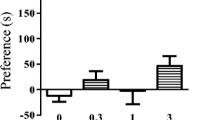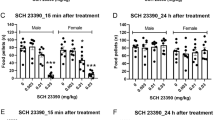Abstract
Dextromethorphan and dextrorphan elicited a stereotyped behavioral syndrome in rats indistinguishable from that produced by PCP and other non-competitive NMDA antagonists. The rank order of potency for the induction of stereotyped behavior in male Sprague-Dawley rats was: MK-801>PCP>(±)cyclazocine>dex-trorphan>(±)ketamine>dextromethorphan. These behavioral potencies were significantly correlated (0.91; P<0.05) with their respective affinities for high affinity [3H]dextrorphan-labelled NMDA receptors in rat forebrain membranes. To address the propensity of dextromethorphan to induce stereotyped behavior, dextrorotatory-opioid induced stereotypies were investigated in female Dark Agouti and female Sprague-Dawley rats. The female Dark Agouti lacks CYP2D1, the cytochrome P450 enzyme which catalyses the oxidative O-demethylation of dextromethorphan to dextrorphan. No differences were observed in either potency or time to peak effect for dextromethorphan to induce stereotyped behavior in the rat strains, suggesting that the affinity of dextromethorphan for NMDA receptors adequately accounts for its ability to induce stereotyped behavior. Female Dark Agouti rats were, however, more sensitive to the effects of dextrorphan, which may reflect differences in the ability of this strain to metabolize dextrorphan. We find no evidence to suggest that dextromethorphan produces a behavioral syndrome in rats that is distinct from that induced by dextrorphan. The commonality between the pharmacologic profiles of these compounds suggests that the abuse potential of dextromethorphan containing antitussive preparations is related to the non-competitive NMDA antagonist activity of dextromethorphan and its metabolites.
Similar content being viewed by others
Author information
Authors and Affiliations
Additional information
Received: 20 December 1997 / Final version: 9 May 1998
Rights and permissions
About this article
Cite this article
Ishmael, J., Franklin, P. & Murray, T. Dextrorotatory opioids induce stereotyped behavior in Sprague-Dawley and Dark Agouti rats. Psychopharmacology 140, 206–216 (1998). https://doi.org/10.1007/s002130050759
Issue Date:
DOI: https://doi.org/10.1007/s002130050759




